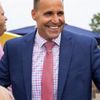Michigan gubernatorial and lieutenant gubernatorial election, 2026
|
← 2022
|
| Governor and Lieutenant Governor of Michigan |
|---|
| Democratic primary Republican primary General election |
| Election details |
| Filing deadline: April 21, 2026 |
| Primary: August 4, 2026 General: November 3, 2026 |
| How to vote |
| Poll times:
7 a.m. to 8 p.m. |
| Race ratings |
Sabato's Crystal Ball: Toss-up Inside Elections: Toss-up |
| Ballotpedia analysis |
| Federal and state primary competitiveness State executive elections in 2026 Impact of term limits in 2026 State government trifectas State government triplexes Ballotpedia's Election Analysis Hub, 2026 |
| Michigan executive elections |
| Governor Lieutenant Governor |
Michigan is holding an election for governor and lieutenant governor on November 3, 2026. The primary is August 4, 2026. The filing deadline is April 21, 2026.
In Michigan, the gubernatorial nominee is selected in the primary. Major and minor party lieutenant gubernatorial nominees are chosen at party conventions and run on a joint ticket with the gubernatorial nominee.
For more information about the primaries in this election, click on the links below:
- Michigan gubernatorial election, 2026 (August 4 Democratic primary)
- Michigan gubernatorial election, 2026 (August 4 Republican primary)
Candidates and election results
Note: The following list includes official candidates only. Ballotpedia defines official candidates as people who:
- Register with a federal or state campaign finance agency before the candidate filing deadline
- Appear on candidate lists released by government election agencies
Governor
General election
The primary will occur on August 4, 2026. The general election will occur on November 3, 2026. Additional general election candidates will be added here following the primary.
General election for Governor of Michigan
Mike Duggan is running in the general election for Governor of Michigan on November 3, 2026.
Candidate | ||
 | Mike Duggan (Independent) | |
 = candidate completed the Ballotpedia Candidate Connection survey. = candidate completed the Ballotpedia Candidate Connection survey. | ||||
| If you are a candidate and would like to tell readers and voters more about why they should vote for you, complete the Ballotpedia Candidate Connection Survey. | ||||
Do you want a spreadsheet of this type of data? Contact our sales team. | ||||
Democratic primary election
Democratic primary for Governor of Michigan
Jocelyn Benson, Kevin Hogan, Marni Sawicki, and Chris Swanson are running in the Democratic primary for Governor of Michigan on August 4, 2026.
 = candidate completed the Ballotpedia Candidate Connection survey. = candidate completed the Ballotpedia Candidate Connection survey. | ||||
| If you are a candidate and would like to tell readers and voters more about why they should vote for you, complete the Ballotpedia Candidate Connection Survey. | ||||
Do you want a spreadsheet of this type of data? Contact our sales team. | ||||
Withdrawn or disqualified candidates
Republican primary election
Republican primary for Governor of Michigan
The following candidates are running in the Republican primary for Governor of Michigan on August 4, 2026.
Candidate | ||
 | Mike Cox | |
 | Joyce Gipson  | |
 | Anthony Hudson | |
 | John James | |
 | Tom Leonard | |
 | Aric Nesbitt | |
 | Ralph Rebandt | |
 | Evan Space  | |
 | Karla Wagner | |
 = candidate completed the Ballotpedia Candidate Connection survey. = candidate completed the Ballotpedia Candidate Connection survey. | ||||
| If you are a candidate and would like to tell readers and voters more about why they should vote for you, complete the Ballotpedia Candidate Connection Survey. | ||||
Do you want a spreadsheet of this type of data? Contact our sales team. | ||||
Lieutenant Governor
There are no official candidates yet for this election.
General election
The general election will occur on November 3, 2026.
Ballotpedia's Candidate Connection survey responses

Ballotpedia asks all federal, state, and local candidates to complete a survey and share what motivates them on political and personal levels. Candidates are asked three required questions for this survey, but they may answer additional optional questions as well.
No candidate in this race has completed Ballotpedia's Candidate Connection survey. Ballotpedia is seeking 100 percent participation so voters can learn more about all the candidates on their ballots.
You can ask candidates in this race to fill out the survey by clicking their names below:
Voting information
- See also: Voting in Michigan
Democratic-held governorship in state Trump won
- See also: Gubernatorial elections, 2026
This is one of five governorships Democrats are defending in states President Donald Trump (R) won in 2024: Arizona, Kansas, Michigan, Pennsylvania, and Wisconsin
Republicans are defending two governorships in a state that Kamala Harris (D) won in 2024: New Hampshire and Vermont.
The table below show which states are holding gubernatorial elections in 2026 and the last presidential and gubernatorial margin of victory in each. Click on the bar below to expand the table.
Polls
- See also: Ballotpedia's approach to covering polls
Polls are conducted with a variety of methodologies and have margins of error or credibility intervals.[1] The Pew Research Center wrote, "A margin of error of plus or minus 3 percentage points at the 95% confidence level means that if we fielded the same survey 100 times, we would expect the result to be within 3 percentage points of the true population value 95 of those times."[2] For tips on reading polls from FiveThirtyEight, click here. For tips from Pew, click here.
Below we provide results for polls from a wide variety of sources, including media outlets, social media, campaigns, and aggregation websites, when available. We only report polls for which we can find a margin of error or credibility interval. Know of something we're missing? Click here to let us know.
| Poll | Dates | Benson | Cox | Duggan (Independent) | James | Leonard | Nesbitt | Undecided/Refused | Other | Undecided | Sample size | Margin of error | Sponsor |
|---|---|---|---|---|---|---|---|---|---|---|---|---|---|
– | 39 | -- | 20 | 36 | -- | -- | -- | -- | 5 | 800 LV | ± 3.5% | Jocelyn Benson's campaign | |
– | 46.5 | -- | -- | 44.6 | -- | -- | 7.8 | 1.2 | -- | 600 LV | ± 4.0% | WDIV and the Detroit News | |
– | 34.2 | 27.7 | 31.4 | -- | -- | -- | 6.8 | -- | -- | 600 LV | ± 4.0% | WDIV and the Detroit News | |
– | 32.2 | -- | 26.1 | 33.8 | -- | -- | 7.8 | 0.2 | -- | 600 LV | ± 4.0% | WDIV and the Detroit News | |
– | 34.3 | -- | 33.3 | -- | 23.8 | -- | 8.4 | 0.2 | -- | 600 LV | ± 4.0% | WDIV and the Detroit News | |
– | 35 | -- | 31.7 | -- | -- | 24.4 | 8.7 | 0.2 | -- | 600 LV | ± 4.0% | WDIV and the Detroit News | |
Mitchell Research and Communications (includes Cox) NoteHypothetical matchup between Jocelyn Benson (D), Mike Cox (R), and Mike Duggan (I). | – | 33 | 32 | 19 | -- | -- | -- | 16 | -- | -- | 616 LV | ± 3.7% | |
Mitchell Research and Communications (includes James) NoteHypothetical matchup between Jocelyn Benson (D), John James (R), and Mike Duggan (I). | – | 31 | -- | 18 | 37 | -- | -- | 14 | -- | -- | 616 LV | ± 3.7% | |
Mitchell Research and Communications (includes Nesbitt) NoteHypothetical matchup between Jocelyn Benson (D), Aric Nesbitt (R), and Mike Duggan (I). | – | 32 | -- | 22 | -- | -- | 27 | 19 | -- | -- | 616 LV | ± 3.7% | |
EPIC-MRA NoteParticipants were asked: "If the election for Governor were held today and the candidates were John James, Jocelyn Benson and Mike Duggan, would you vote for John James the Republican, Jocelyn Benson the Democrat, or Mike Duggan the Independent?" | – | 33 | -- | 20 | 34 | -- | -- | 13 | -- | -- | 600 RV | ± 4.0% | |
| Note: LV is likely voters, RV is registered voters, and EV is eligible voters. | |||||||||||||
General election race ratings
- See also: Race rating definitions and methods
Ballotpedia provides race ratings from four outlets: The Cook Political Report, Inside Elections, Sabato's Crystal Ball, and DDHQ/The Hill. Each race rating indicates if one party is perceived to have an advantage in the race and, if so, the degree of advantage:
- Safe and Solid ratings indicate that one party has a clear edge and the race is not competitive.
- Likely ratings indicate that one party has a clear edge, but an upset is possible.
- Lean ratings indicate that one party has a small edge, but the race is competitive.[3]
- Toss-up ratings indicate that neither party has an advantage.
Race ratings are informed by a number of factors, including polling, candidate quality, and election result history in the race's district or state.[4][5][6]
| Race ratings: Michigan gubernatorial election, 2026 | |||||||||
|---|---|---|---|---|---|---|---|---|---|
| Race tracker | Race ratings | ||||||||
| 2/24/2026 | 2/17/2026 | 2/10/2026 | 2/3/2026 | ||||||
| The Cook Political Report with Amy Walter | Toss-up | Toss-up | Toss-up | Toss-up | |||||
| Inside Elections with Nathan L. Gonzales | Toss-up | Toss-up | Toss-up | Toss-up | |||||
| Larry J. Sabato's Crystal Ball | Toss-up | Toss-up | Toss-up | Toss-up | |||||
| Note: Ballotpedia reviews external race ratings every week throughout the election season and posts weekly updates even if the media outlets have not revised their ratings during that week. | |||||||||
Past elections
The section below details election results for this office in elections dating back to 2014.
2022
General election
General election for Governor of Michigan
The following candidates ran in the general election for Governor of Michigan on November 8, 2022.
Candidate | % | Votes | ||
| ✔ |  | Gretchen Whitmer (D) | 54.5 | 2,430,505 |
 | Tudor Dixon (R) | 43.9 | 1,960,635 | |
 | Mary Buzuma (L)  | 0.9 | 38,800 | |
 | Donna Brandenburg (U.S. Taxpayers Party) | 0.4 | 16,246 | |
 | Kevin Hogan (G)  | 0.2 | 10,766 | |
 | Daryl Simpson (Natural Law Party)  | 0.1 | 4,973 | |
 | Evan Space (Independent) (Write-in) | 0.0 | 26 | |
| Other/Write-in votes | 0.0 | 21 | ||
| Total votes: 4,461,972 | ||||
 = candidate completed the Ballotpedia Candidate Connection survey. = candidate completed the Ballotpedia Candidate Connection survey. | ||||
| If you are a candidate and would like to tell readers and voters more about why they should vote for you, complete the Ballotpedia Candidate Connection Survey. | ||||
Do you want a spreadsheet of this type of data? Contact our sales team. | ||||
Democratic primary election
Democratic primary for Governor of Michigan
Incumbent Gretchen Whitmer advanced from the Democratic primary for Governor of Michigan on August 2, 2022.
Candidate | % | Votes | ||
| ✔ |  | Gretchen Whitmer | 100.0 | 938,382 |
| Total votes: 938,382 | ||||
 = candidate completed the Ballotpedia Candidate Connection survey. = candidate completed the Ballotpedia Candidate Connection survey. | ||||
| If you are a candidate and would like to tell readers and voters more about why they should vote for you, complete the Ballotpedia Candidate Connection Survey. | ||||
Do you want a spreadsheet of this type of data? Contact our sales team. | ||||
Withdrawn or disqualified candidates
- Articia Bomer (D)
Republican primary election
Republican primary for Governor of Michigan
The following candidates ran in the Republican primary for Governor of Michigan on August 2, 2022.
Candidate | % | Votes | ||
| ✔ |  | Tudor Dixon | 39.7 | 436,350 |
 | Kevin Rinke | 21.5 | 236,306 | |
 | Garrett Soldano | 17.5 | 192,442 | |
 | Ryan Kelley | 15.1 | 165,587 | |
 | Ralph Rebandt  | 4.1 | 45,046 | |
 | James Craig (Write-in) | 2.1 | 23,521 | |
 | Elizabeth Adkisson (Write-in) | 0.0 | 11 | |
| Justin Blackburn (Write-in) | 0.0 | 10 | ||
| Total votes: 1,099,273 | ||||
 = candidate completed the Ballotpedia Candidate Connection survey. = candidate completed the Ballotpedia Candidate Connection survey. | ||||
| If you are a candidate and would like to tell readers and voters more about why they should vote for you, complete the Ballotpedia Candidate Connection Survey. | ||||
Do you want a spreadsheet of this type of data? Contact our sales team. | ||||
Withdrawn or disqualified candidates
- Perry Johnson (R)
- Michael Markey Jr. (R)
- Bob Scott (R)
- Austin Chenge (R)
- Michael Brown (R)
- Donna Brandenburg (R)
Green convention
Green convention for Governor of Michigan
Kevin Hogan advanced from the Green convention for Governor of Michigan on April 23, 2022.
Candidate | ||
| ✔ |  | Kevin Hogan (G)  |
 = candidate completed the Ballotpedia Candidate Connection survey. = candidate completed the Ballotpedia Candidate Connection survey. | ||||
| If you are a candidate and would like to tell readers and voters more about why they should vote for you, complete the Ballotpedia Candidate Connection Survey. | ||||
Do you want a spreadsheet of this type of data? Contact our sales team. | ||||
Libertarian convention
Libertarian convention for Governor of Michigan
Mary Buzuma advanced from the Libertarian convention for Governor of Michigan on July 10, 2022.
Candidate | ||
| ✔ |  | Mary Buzuma (L)  |
 = candidate completed the Ballotpedia Candidate Connection survey. = candidate completed the Ballotpedia Candidate Connection survey. | ||||
| If you are a candidate and would like to tell readers and voters more about why they should vote for you, complete the Ballotpedia Candidate Connection Survey. | ||||
Do you want a spreadsheet of this type of data? Contact our sales team. | ||||
U.S. Taxpayers Party convention
U.S. Taxpayers Party convention for Governor of Michigan
Donna Brandenburg advanced from the U.S. Taxpayers Party convention for Governor of Michigan on July 23, 2022.
Candidate | ||
| ✔ |  | Donna Brandenburg (U.S. Taxpayers Party) |
 = candidate completed the Ballotpedia Candidate Connection survey. = candidate completed the Ballotpedia Candidate Connection survey. | ||||
| If you are a candidate and would like to tell readers and voters more about why they should vote for you, complete the Ballotpedia Candidate Connection Survey. | ||||
Do you want a spreadsheet of this type of data? Contact our sales team. | ||||
2018
General election
General election for Governor of Michigan
The following candidates ran in the general election for Governor of Michigan on November 6, 2018.
Candidate | % | Votes | ||
| ✔ |  | Gretchen Whitmer (D) | 53.3 | 2,266,193 |
 | Bill Schuette (R)  | 43.7 | 1,859,534 | |
 | Bill Gelineau (L) | 1.3 | 56,606 | |
 | Todd Schleiger (U.S. Taxpayers Party) | 0.7 | 29,219 | |
 | Jennifer Kurland (G) | 0.7 | 28,799 | |
 | Keith Butkovich (Natural Law Party) | 0.2 | 10,202 | |
| Other/Write-in votes | 0.0 | 32 | ||
| Total votes: 4,250,585 (100.00% precincts reporting) | ||||
 = candidate completed the Ballotpedia Candidate Connection survey. = candidate completed the Ballotpedia Candidate Connection survey. | ||||
| If you are a candidate and would like to tell readers and voters more about why they should vote for you, complete the Ballotpedia Candidate Connection Survey. | ||||
Do you want a spreadsheet of this type of data? Contact our sales team. | ||||
Withdrawn or disqualified candidates
- Richard Sills (Independent)
- Ryan Henry Cox (Independent)
Democratic primary election
Democratic primary for Governor of Michigan
Gretchen Whitmer defeated Abdul El-Sayed and Shri Thanedar in the Democratic primary for Governor of Michigan on August 7, 2018.
Candidate | % | Votes | ||
| ✔ |  | Gretchen Whitmer | 52.0 | 588,436 |
 | Abdul El-Sayed | 30.2 | 342,179 | |
 | Shri Thanedar | 17.7 | 200,645 | |
| Total votes: 1,131,260 | ||||
 = candidate completed the Ballotpedia Candidate Connection survey. = candidate completed the Ballotpedia Candidate Connection survey. | ||||
| If you are a candidate and would like to tell readers and voters more about why they should vote for you, complete the Ballotpedia Candidate Connection Survey. | ||||
Do you want a spreadsheet of this type of data? Contact our sales team. | ||||
Withdrawn or disqualified candidates
- Kentiel White (D)
- Bill Cobbs (D)
- Justin Giroux (D)
Republican primary election
Republican primary for Governor of Michigan
Bill Schuette defeated Brian Calley, Patrick Colbeck, and Jim Hines in the Republican primary for Governor of Michigan on August 7, 2018.
Candidate | % | Votes | ||
| ✔ |  | Bill Schuette  | 50.7 | 501,959 |
 | Brian Calley | 25.2 | 249,185 | |
 | Patrick Colbeck | 13.1 | 129,646 | |
 | Jim Hines | 11.0 | 108,735 | |
| Total votes: 989,525 | ||||
 = candidate completed the Ballotpedia Candidate Connection survey. = candidate completed the Ballotpedia Candidate Connection survey. | ||||
| If you are a candidate and would like to tell readers and voters more about why they should vote for you, complete the Ballotpedia Candidate Connection Survey. | ||||
Do you want a spreadsheet of this type of data? Contact our sales team. | ||||
Withdrawn or disqualified candidates
- Evan Space (R)
Green primary election
Green primary for Governor of Michigan
Jennifer Kurland advanced from the Green primary for Governor of Michigan on August 7, 2018.
Candidate | ||
| ✔ |  | Jennifer Kurland |
 = candidate completed the Ballotpedia Candidate Connection survey. = candidate completed the Ballotpedia Candidate Connection survey. | ||||
| If you are a candidate and would like to tell readers and voters more about why they should vote for you, complete the Ballotpedia Candidate Connection Survey. | ||||
Do you want a spreadsheet of this type of data? Contact our sales team. | ||||
Withdrawn or disqualified candidates
- Dwain Reynolds (G)
Libertarian primary election
Libertarian primary for Governor of Michigan
Bill Gelineau defeated John Tatar in the Libertarian primary for Governor of Michigan on August 7, 2018.
Candidate | % | Votes | ||
| ✔ |  | Bill Gelineau | 57.8 | 4,034 |
| John Tatar | 42.2 | 2,941 | ||
| Total votes: 6,975 | ||||
 = candidate completed the Ballotpedia Candidate Connection survey. = candidate completed the Ballotpedia Candidate Connection survey. | ||||
| If you are a candidate and would like to tell readers and voters more about why they should vote for you, complete the Ballotpedia Candidate Connection Survey. | ||||
Do you want a spreadsheet of this type of data? Contact our sales team. | ||||
2014
| Governor and Lieutenant Governor of Michigan, 2014 | ||||
|---|---|---|---|---|
| Party | Candidate | Vote % | Votes | |
| Republican | 50.9% | 1,607,399 | ||
| Democratic | Mark Schauer/Lisa Brown | 46.9% | 1,479,057 | |
| Libertarian | Mary Buzuma/Scott Boman | 1.1% | 35,723 | |
| U.S. Taxpayers | Mark McFarlin/Richard Mendoza | 0.6% | 19,368 | |
| Green | Paul Homeniuk/Candace R. Caveny | 0.5% | 14,934 | |
| Nonpartisan | Write-in votes | 0% | 50 | |
| Total Votes | 3,156,531 | |||
| Election results via Michigan Department of State | ||||
See also
| Michigan | State Executive Elections | News and Analysis |
|---|---|---|
|
|
|
|
External links
- Search Google News for this topic
- Governor of Michigan official website
- Lieutenant Governor of Michigan official website
Footnotes
- ↑ For more information on the difference between margins of error and credibility intervals, see explanations from the American Association for Public Opinion Research and Ipsos.
- ↑ Pew Research Center, "5 key things to know about the margin of error in election polls," September 8, 2016
- ↑ Inside Elections also uses Tilt ratings to indicate an even smaller advantage and greater competitiveness.
- ↑ Amee LaTour, "Email correspondence with Nathan Gonzalez," April 19, 2018
- ↑ Amee LaTour, "Email correspondence with Kyle Kondik," April 19, 2018
- ↑ Amee LaTour, "Email correspondence with Charlie Cook," April 22, 2018












